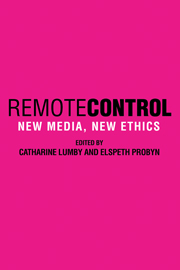Book contents
- Frontmatter
- Contents
- List of Contributors
- Acknowledgements
- 1 Introduction: An Ethics of Engagement
- 2 Real Appeal: The Ethics of Reality TV
- 3 Arguing about Ethics
- 4 ‘Their own media in their own language’
- Beyond the Disconnect: Practical Ethics
- 5 A Viable Ethics: Journalists and the ‘Ethnic Question’
- 6 Ethics, Entertainment and the Tabloid: The Case of Talkback Radio in Australia
- Money versus Ethics
- 7 Eating into Ethics: Passion, Food and Journalism
- Beyond Food Porn
- 8 Ethics impossible? Advertising and the Infomercial
- Pitching to the ‘Tribes’: New Ad Techniques
- 9 Diary of a Webdiarist: Ethics Goes Online
- 10 Control-SHIFT: Censorship and the Internet
- Representing the Asylum Seekers
- 11 The Ethics of Porn on the Net
- Ethics and Sex
- 12 Grassroots Ethics: The Case of Souths versus News Corporation
- 13 Great Pretenders: Ethics and the Rise of Pranksterism
- The Limits of Satire
- Index
6 - Ethics, Entertainment and the Tabloid: The Case of Talkback Radio in Australia
Published online by Cambridge University Press: 18 December 2009
- Frontmatter
- Contents
- List of Contributors
- Acknowledgements
- 1 Introduction: An Ethics of Engagement
- 2 Real Appeal: The Ethics of Reality TV
- 3 Arguing about Ethics
- 4 ‘Their own media in their own language’
- Beyond the Disconnect: Practical Ethics
- 5 A Viable Ethics: Journalists and the ‘Ethnic Question’
- 6 Ethics, Entertainment and the Tabloid: The Case of Talkback Radio in Australia
- Money versus Ethics
- 7 Eating into Ethics: Passion, Food and Journalism
- Beyond Food Porn
- 8 Ethics impossible? Advertising and the Infomercial
- Pitching to the ‘Tribes’: New Ad Techniques
- 9 Diary of a Webdiarist: Ethics Goes Online
- 10 Control-SHIFT: Censorship and the Internet
- Representing the Asylum Seekers
- 11 The Ethics of Porn on the Net
- Ethics and Sex
- 12 Grassroots Ethics: The Case of Souths versus News Corporation
- 13 Great Pretenders: Ethics and the Rise of Pranksterism
- The Limits of Satire
- Index
Summary
IN AUSTRALIA IN 1999, A GROUP OF CONSERVATIVE AND COMMERCIALLY dominant talkback radio hosts – pretty much the epitome of ‘the tabloid’ in its local incarnation – were involved in a scandal which exposed widespread exploitation of their market power through secret paid endorsements for products, companies and political positions. The consequent official inquiry found it difficult to locate just what was the ethical principle being transgressed, partly because these were not (ethically bound) journalists but (ethically free) ‘entertainers’, and partly because of the general evacuation of such principles from the industry codes of practice. The privileging of commercial responsibilities and the gradual displacement of community responsibilities which have occurred over the last decade have, in effect, reduced the possibility that an ethical or democratic critique of mass media practice could now be effectively elaborated and understood.
What we now know as the ‘Cash for Comment’ scandal presents us with a case where, in my view, the media's successful and unregulated pursuit of a mass audience took it beyond the reach of ethical appeal against its specific practices. Tellingly, in its defence, the media organisation concerned barely even pretended to acknowledge its responsibility to any broader community interests than those of the mass audience. The contest between commercial and community/democratic imperatives is at its most naked here; and ultimately at issue is the very relevance of an ethical regime within an entertainment-based, rather than an information-based, ‘tabloid’ media.
- Type
- Chapter
- Information
- Remote ControlNew Media, New Ethics, pp. 87 - 99Publisher: Cambridge University PressPrint publication year: 2003
- 5
- Cited by



